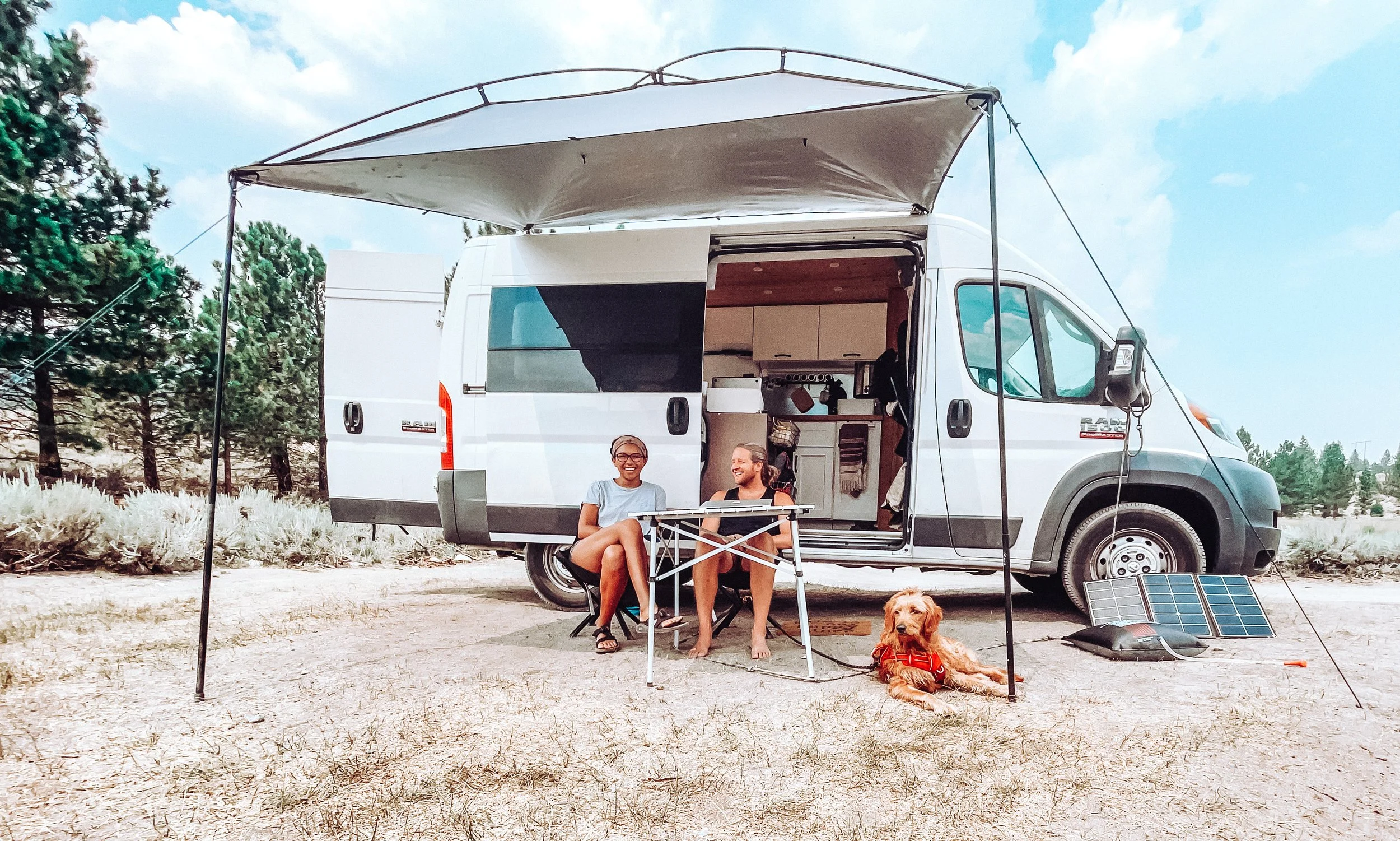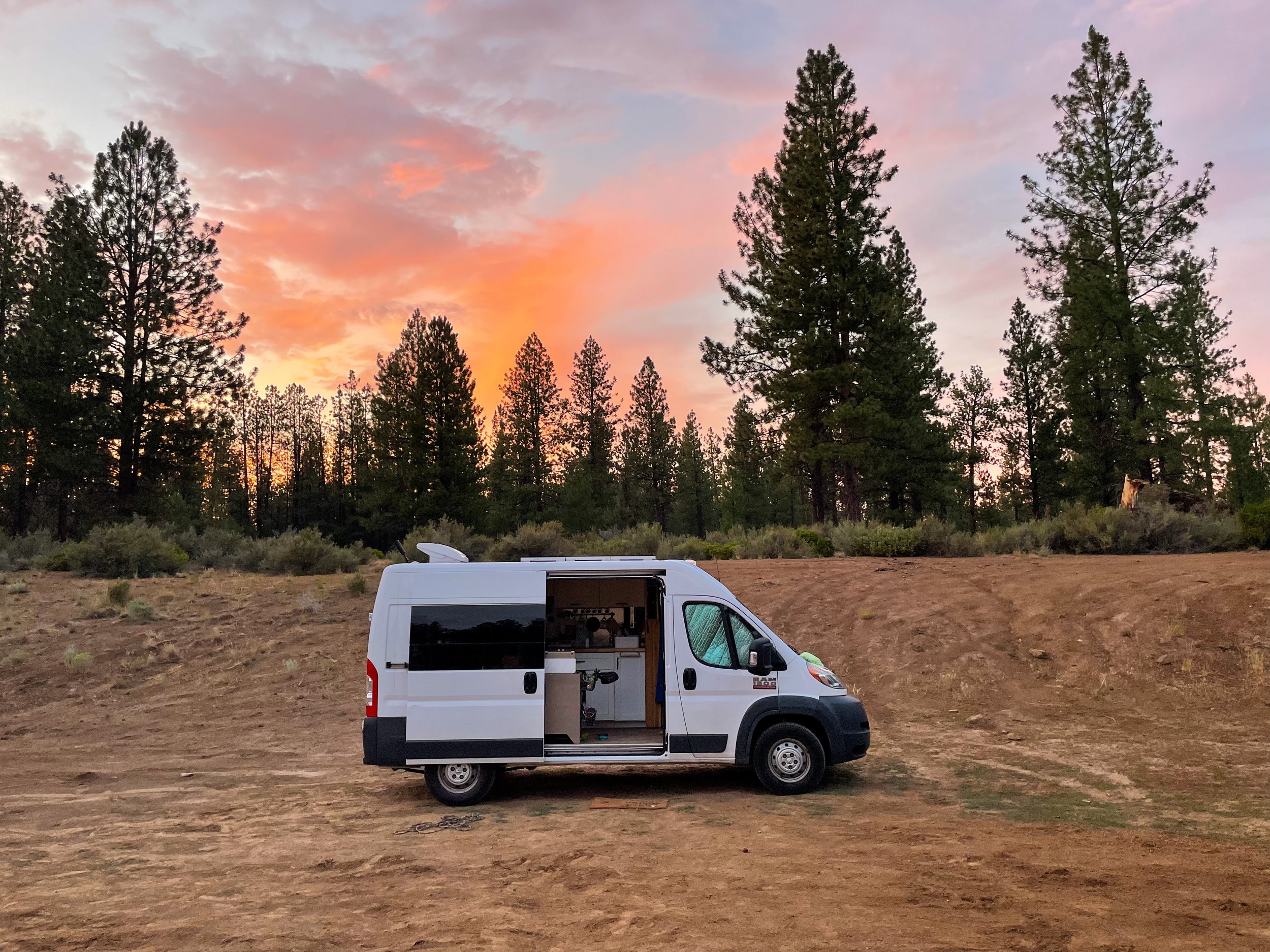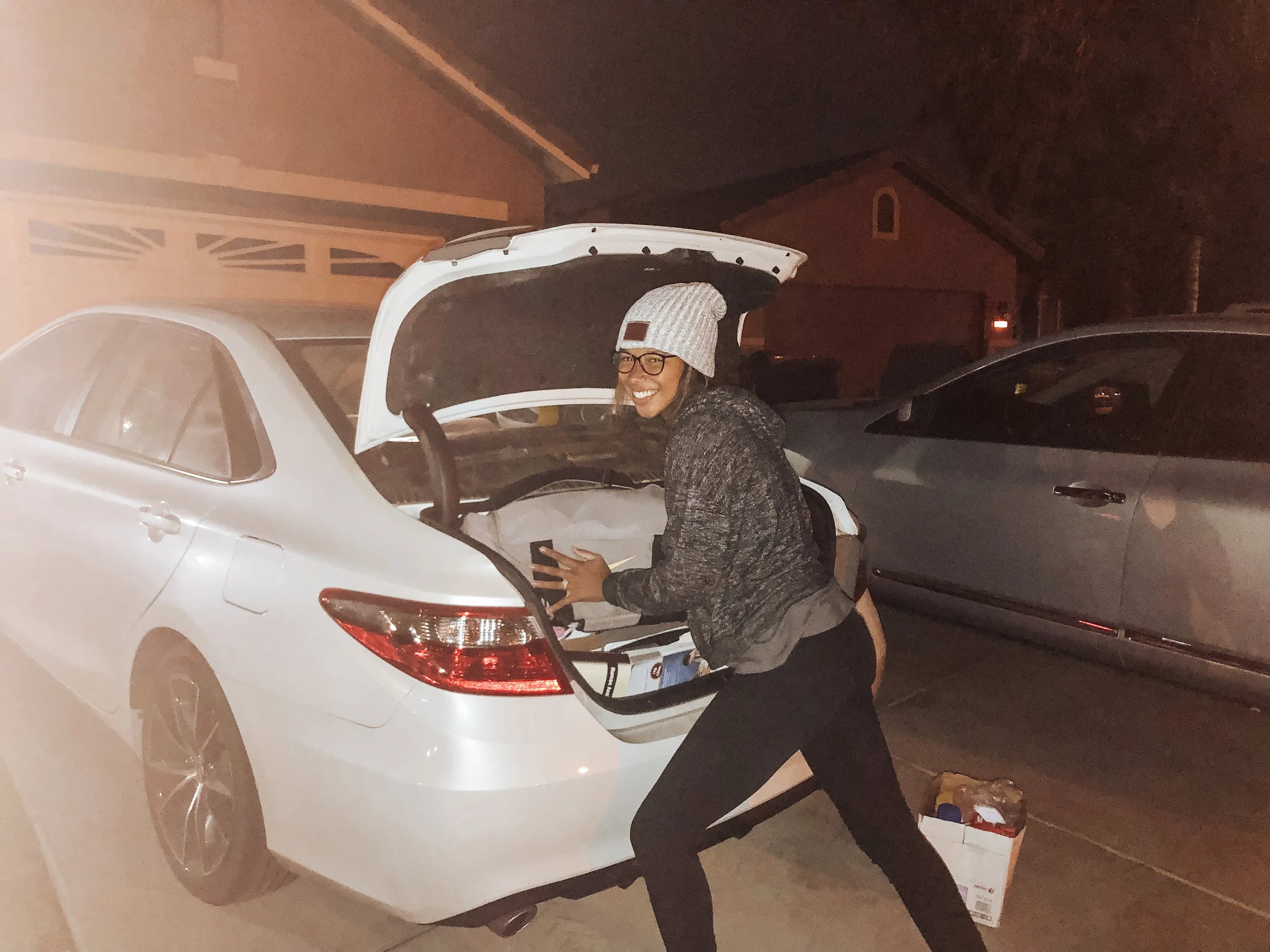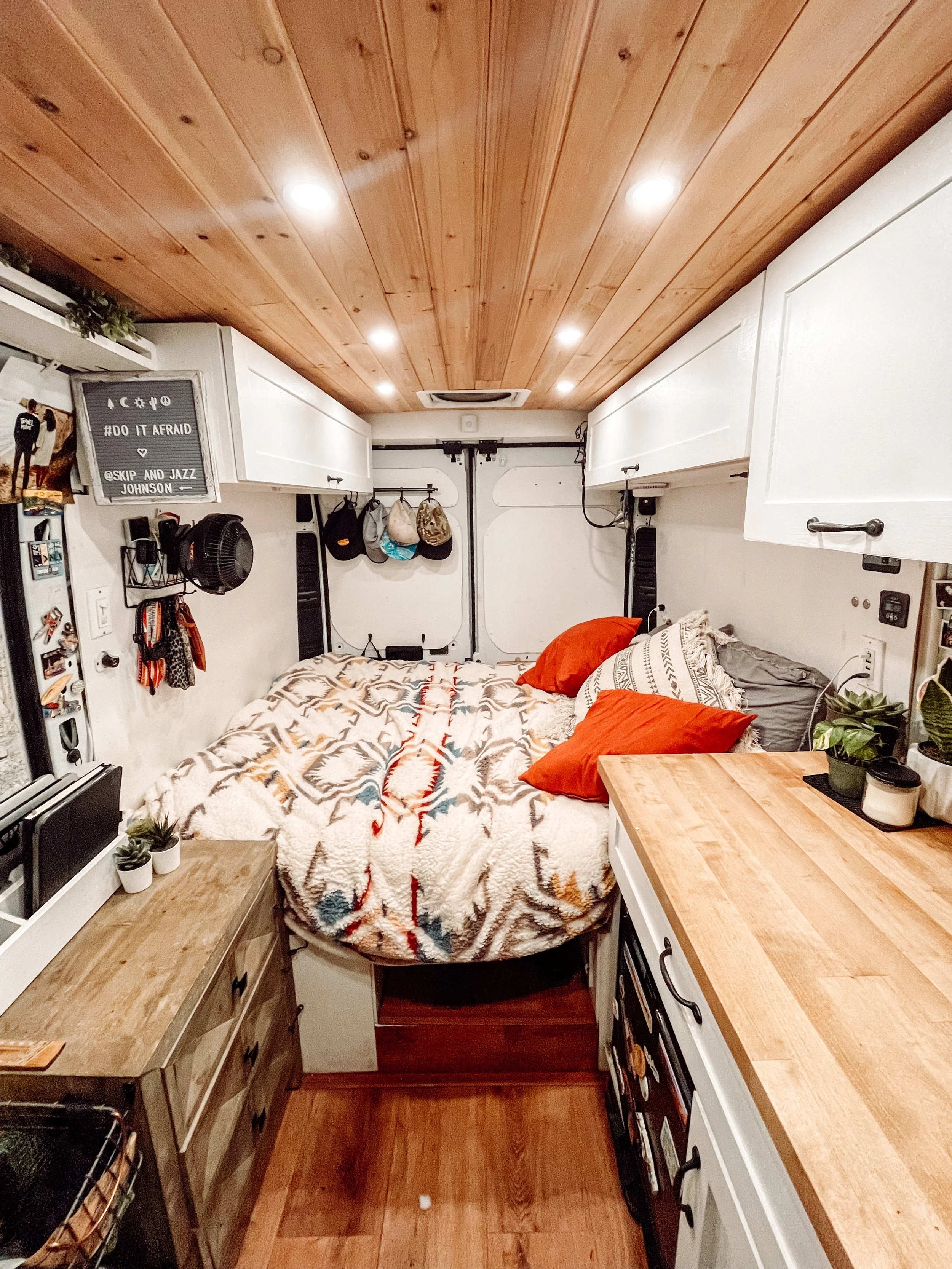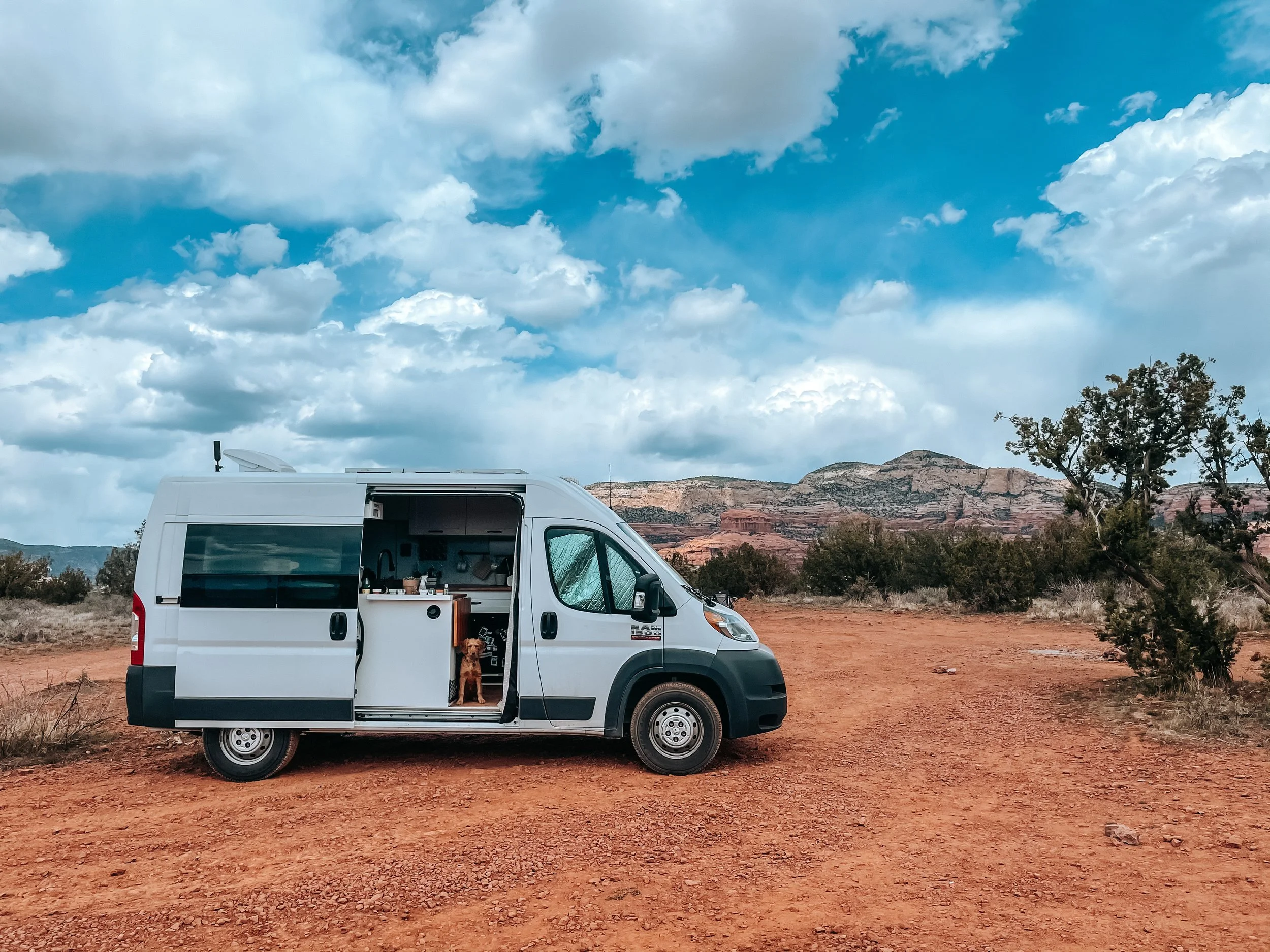Pros and Cons of Vanlife as a Travel Therapist
Chilling outside our self-built campervan, Beverly Ann the Van AKA “Bev”, with our sweet pup, Honey Bee.
Tiny living is as hot as it’s ever been. More and more people are leaving the typical multi-bedroom/bathroom house and opting for a life on wheels. If you’ve scrolled any social media platform, you’ve surely seen the glorified #vanlife a time or two.
But is living in a van worth it as a travel therapist?
As a travel nurse, therapist, or allied professional, you may have considered buying a campervan, RV, Airstream, or school bus to live in during your assignments. You may want to avoid the headache of the short-term housing search, save money on rent, or make your already adventurous life more mobile.
We lived in our first self-built campervan for 2 years and we’re nearly finished building our 2nd campervan to hit the road in. So far, I’ve taken three travel physical therapy contracts while living in the van and it’s been a blast! I can’t emphasize enough how amazing it is to ALWAYS have your home with you, no matter where you’re exploring. But just like anything in life, there are pros and cons to vanlife as a travel therapist.
Before the van (during my first two years of travel therapy), we opted for short-term housing. Now, we weigh the pros and cons of each assignment location (e.g. how much money we’ll save by staying in the van, the weather, proximity of RV park to work) before deciding whether we’ll live in our van vs short-term housing.
This post will give you a peek into the lifestyle and help you decide if you’re suited for a life on wheels.
I’ll be speaking directly to vanlife in this post since that’s what we have experience in. Keep in mind that there’s a lot of overlap between different types of tiny homes on wheels, but there are also certainly differences between vanlife, RV life, and skoolie life.
Keep reading to decide if vanlife as a travel therapist is right move for you.
Pros & Cons of Vanlife as a Travel Therapist
(Click link to jump ahead)
Pros
Cons
Pros of Vanlife as a Travel Therapist
You don’t have to work in a state to explore it
If you want to work in any state as a travel therapist, you have to obtain your license there. The licensing process can be a TON of work and cost a pretty penny. Since we got the van, I’ve stopped applying for and maintaining so many PT licenses.
Now that we have our campervan, I prefer to take my contracts in California — where there are tons of jobs, the pay is great, the weather is phenomenal year-round, and it’s just a vibe we love overall.
Having our campervan allows us to explore whatever state or area we want while I’m not working. At an affordable price point. AND at our own pace.
We used to burn the candle on both ends every weekend, trying to see everything there was to see in an area in just 13 weeks. It’s been really nice not feeling like exhausted weekend warriors all the time.
Speaking of not working...
Watching the sunset at a beautiful dispersed camping spot in Bend, Oregon.
Van life saves you money
Gain time freedom — you can afford to take more time off work
One of our favorite aspects of van life is the time and financial freedom it provides. Before we had our campervan, I always felt like I was in a rush to take my next assignment.
We’re from the Midwest and we prefer to take jobs on the West Coast, a long way from home. So if I decided to take a couple of weeks off work (prior to having the van), we had to consider the cost of AirBnBs/hotels during my time off work. Because of the high cost, we usually just ended up going back home during my off-time to live for free vs. exploring all the West Coast had to offer.
Now that we have our van, we can opt for free camping and overnight parking spots while I’m not working. So we can virtually live for free, even on the West Coast. SCORE! This relieves SO much financial stress when I’m not bringing in a weekly paycheck.
Our expenses are incredibly low when we live in the van, which gives us more time and money for adventures, soul-searching, R&R, and exploring our passions outside of work.
I’ve worked only six months per year in 2019, 2020, and 2021 because of the financial freedom that travel therapy + vanlife allow. How awesome is that?!
Not to mention, you’ll also avoid paying for hotels when you’re en route to your next travel PT assignment. And when you’re out adventuring on the weekends. More on that below...
Weekend adventures are cheaper and easier
Weekend adventures during your assignment will be cheaper with a campervan for many of the same reasons discussed above. Before the van, we would sometimes forego weekend adventures because hotel and AirBnB prices add up quickly – especially in popular weekend destinations (think Santa Barbara, San Diego, Austin, Denver, etc.).
Now, all we have to do is make sure there are dispersed camping or overnight parking options in the area before we hit the road for a weekend of fun.
Imagine, for weekend adventures, you:
Automatically have all of your belongings packed up and ready to go
Save valuable time by avoiding planning what to pack, packing, and unpacking every weekend.
Sleep in your bed all weekend even when you’re not technically “home” (avoid those crappy nights of sleep in an AirBnB bed – no more returning to your work-week ina
Stock up on groceries before you leave to cook all your meals and avoid paying to eat out while on the road. With your fridge, oven, and stovetop in your campervan.
Stay at an RV park while on assignment to save on rent
It’s important to mention that if you’re going to accept tax-free per diems as a traveler, you’re required to maintain a tax home. We’re not tax experts by any means, so please consult Travel Tax about your specific situation.
One way to duplicate expenses is to pay “rent” for a spot at an RV park during your assignment. We’ve done this before and saved around $4,000-$5,000 per 3-month assignment each time. We paid $600 in Seaside, OR whereas most short-term housing options were $1,800+. That’s a lot of potential van upgrades! 🤑
The amount of money you’ll save 100% depends on the location you’re traveling to and what all amenities your RV park offers. For example, you’ll pay a lot more for an RV park in coastal California than you will be in the Midwest. You should also expect to pay more for an RV park that offers extra amenities like a pool, hot tub, or gym vs a campsite with bare-bones amenities.
If you have a campervan with an off-grid electrical and plumbing system like ours (meaning it can function without RV hookups), you can save even more money by opting for a primitive campsite instead a campsite with full hook-ups.
It’s also important to note that not all RV parks accept self-built campervans. Some have specific requirements. Be sure to call ahead and make sure you’ll have an RV park to stay at before accepting an assignment.
Avoid getting stuck in a lease if you get cancelled
Though it is unlikely, it’s possible to have your contract canceled as a travel therapist.
For this reason, we generally recommend you avoid renting for 3 months at a time altogether. Opt for a month-to-month lease instead (we’ve been able to negotiate this with most landlords) if you’re going the short-term housing route.
If you’re living in your campervan, most RV parks will either have you pay daily, weekly, or monthly, so you can avoid the financial responsibility of being stuck in a lease if you get canceled. You can usually get a better deal if you pay monthly vs daily.
Avoid packing/unpacking every three months
If you’ve worked several contracts, you know this process starts to get old. You rush to deep clean your apartment and pack up all your stuff, all while still working. Then you rush to stuff all your things into your car so you can drive off to your next assignment.
With the van, it’s been so nice to just show up to a new city, start my job, and not have to deal with the hassle of unpacking all my belongings only to pack them again three months later.
And unless you’re a car tetris queen (like Jazz), you’re probably going to either have stuff visible in your back seat or in a roof storage box. While you’re taking time off and adventuring between assignments, you’re probably going to be worried about having all your stuff visible in your car, which can lead to a break-in.
Having a campervan means your things will be out of sight and secure in your van. Most people just think we’re a work van or an Amazon van, which helps us stay under the radar.
Jazz stuffing everything into our trunk when we used to fit all our belongings in a Toyota Camry. She’s the Car Tetris QUEEN!
Community on the road
The travel healthcare and vanlife communities are so special to us. Both for their own unique reasons. Traveling can be lonely. But the more connected you are with these communities from the start, the less lonely you’ll be.
PRO TIPS:
Attend The Traveler’s Conference (held every September in Vegas) to meet your travel family
Download The MedVenture App to meet other travelers near your worksite
Make an Instagram account to find your vanlife/travel therapy family. Sift through the hashtags (e.g. #vanlife, #travelPT, #travelphysicaltherapy) and start following people. Strike up a conversation in the DMs and you’ll feel like friends before you know it!
Between these two communities, there will almost always be a nomad to meet up with somewhere near your contract location. AND it’s so awesome to have a network of friends all over the U.S.A. How cool will it be when we’re all in our 70s and flying out to see each other?!
Learn more about avoiding avoiding loneliness and finding friends on the road here.
Hanging out with other travel healthcare professionals at a traveler meet-up in San Jose, CA.
A consistent space to call home
It can be hard to want to put in the effort and money to make a place feel like “home” when you’re moving into a new place every 3 months. As travelers, we don’t often get that warm, fuzzy feeling of “home”.
But with your van, you can put in the effort for those small touches since it’ll be your long-term home. As a full-time nomad, it’s pretty special to come back to a space that YOU created for yourself. We love that we’re actually able to buy decor and make our home away from home ACTUALLY feel like a home.
Avoid the short-term housing search
We all know the short-term housing search can be a struggle. Some areas will have little to no housing options available, or the housing prices are outrageous. Having the option to stay in the van is EVERYTHING when I’m scoping out my next contract.
If we hadn’t had the van, I wouldn’t have been able to take one of my favorite contracts to date on the northern Oregon coast. We searched for housing far and wide, but it was almost impossible to come by. But because we had the van, I was still able to take the contract despite the lack of housing because there were several RV parks in the area.
Pet owners don’t have to find pet-friendly housing
Where my pet owners at?! So you found the PERFECT place to stay at during your next contract. It’s only a 5-minute commute from work, walkable distance to downtown, and it’s right in your budget range.
Plot twist: You forgot to check and it’s not pet-friendly. The struggle can be too real to find pet-friendly housing that is in a good location and fits your budget. If you’re an animal lover and can’t imagine life without your furry family, vanlife might be a great option for you.
Our sweet pup, Honey Bee, hanging out at a dispersed camping spot in Sedona, Arizona
Cons of Vanlife as a Travel Physical Therapist
Weather can make or break your assignment
In a campervan, the weather basically dictates where you will take your travel therapy or travel nursing assignments. That being said, you can winterize your van with a diesel/gas heater or survive the summer by installing an AC. BUT, it’ll cost you a pretty penny.
And even if your tiny space allows you to survive the elements, you won’t want to step outside if it’s super cold or super hot. The walls can start to close in real quick in such a small space if you’re living IN your van, and not just OUT OF your van.
This isn’t usually an issue for us because we like to stay where the weather is mild year-round. Looking at you, West Coast. 👀 Normally, we have the all the doors open and practically live outside.
For my second go-round at a contract in the PNW, we opted to rent a studio because we’ve learned the rainy season in the PNW is not for us while living in our van. When it’s raining on and off constantly throughout the day, you start to feel cooped up in a mere 60 square feet of space.
Solution: If you’re going to live in a campervan, I’d plan to weather chase year-round. If you like the shred the pow, I’d build a gas or diesel heater into your van build budget.
Weekly van life chores
There are more chores in vanlife than house or apartment life. And they have to be done more often.
Vanlife chores include:
Water/food: You can only store so much water or so much food in your vehicle. So plan to make water runs and grocery store frequently. We can make it about a week with our van with groceries or 5 days with water before needing to stock up again.
Laundry: You should also plan for weekly trips to the laundromat since you’ll need to wash your work attire. (SIDE NOTE: The laundromat is not nearly as miserable when you live in your van because your home is just right outside the door. So you can go chill out or meal prep out in the van while you’re waiting for the cycle to finish.)
Showers: If you don’t have a shower build into your van, you’ll have to either shower at your RV park, get an outdoor shower setup, or shower at your gym. We use a Planet Fitness Black Card membership to get access to all gyms in the U.S.
Dishes: You’ll be hand washing everything while also conserving water, so that’s always fun.
One big personal challenge we’ve faced in vanlife is not wanting to cook as often.When we live in short-term housing, we always bulk prepare a meal or two on Sundays before the work week because we had an oven, a grill and a slow cooker.
But in the van, you’re always conserving energy so devices like your Vitamix, air fryer, instant pot, and microwave draw a significant amount of energy.
While living vanlife we’ve struggled to prepare meals (because they’re time-consuming, require a lot of counter space and equipment, and they’re a lot of work to clean up) and opted for meals that are quick and easy to clean up. We’re working on it!
Solution: Prioritize your cooking set-up in your van. You can totally install an oven, a stovetop, and all the fixins’ – we just decided not to in our build. You can also bulk up your electrical system so you can use all your kitchen appliances to your heart’s content. In our 2nd van build, we’ve opted for a much bigger fridge and a different electrical setup so we can hopefully handful more appliance use. Wish us luck!
Solution: Patience? LOL. Not gonna lie, these things can really get to you at the end of a long workday. But for the lifestyle, it’s more than worth it.
You still have to pay rent to maintain a tax home
Even though you have a home on wheels, you still have to pay “rent” wherever you’re planning to take an assignment.
To our knowledge, a monthly van payment does not qualify as paying rent. So can’t just stealth camp in your van during an assignment and pocket your entire housing stipend (legally, at least).
Again, we are by no means tax experts and you should consult Travel Tax for any specific questions regarding your tax home and duplicating expenses. They are the experts.
Long work commutes / Gas money
These big, heavy campervans aren’t the most gas efficient vehicles out there – go figure.
We estimate our campervan gets 14-16 miles per gallon.
If you’re planning on commuting a long distance to work every day, vanlife may not be for you.
Or if you prefer to work home health, vanlife might not be for you. This could be argued because you technically COULD use your van to drive from house to house if you’re working in home health. And having your home right outside the patient’s house would be nice on lunch break. But you probably don’t want to put that many miles on your vehicle/home because that will shorten the lifespan of your campervan and lead to more wear and tear and maintenance costs on the vehicle.
An important consideration: If there’s two of you and one of you will work from the van, keep in mind that the non-healthcare traveler will still need a roof over their head during their workday. They might have to drop you off at work and pick you up after work if this is the case.
We’ve handled this situation in different ways, depending on the commute distance. During one contract, my work was a 25 min (about 25 miles) commute from our campsite. We didn’t want to put that many miles on the van or spend that much on gas, so Jazz worked from the parking lot of my workplace during that contract.
More recently, our campsite was only a 10 min drive (about 5 miles) from my workplace. So I would drive us to work in the morning, then Jazz would drive it back to work at the campsite during the day, and then drive back at the end of the day to pick me up. This also allowed our energetic puppy to play outside all day.
Most recently, we were building out our 2nd campervan while I was on contract in L.A. My commute was 30-45 min depending on traffic, so I opted to buy an e-bike for $500 and ride it to/from work, which was about 45 min one-way. And gas was over $5.00/gallon at this point so it ended up being a great call, both for our pockets and mileage on the new van.
Sometimes you just have to get creative!
Solution: Stay as close to work as possible since that’s where you’ll be driving most days of the week. Be sure to make sure there’s an RV park near your worksite before accepting an assignment.
Solution: Buy a beater car for daily commutes and sell at the end of your assignment.
Packing up your home every day to go to work
There are all kinds of moving pieces in a van. You can’t just hop in the front cab and take off in the morning like a car.
To make sure your van is drivable, you have to pick up your outdoor setup, secure your cabinet/drawer latches, make sure all your cups/dishes are put away and countertops are cleared. There have been so many mornings where we forget to latch a drawer, it flies out and makes a loud crash, and scares the sh*t out of us while we’re still barely awake.
Not a fun way to start a morning. 😅
Solution: Make sure the van is drive-ready the night before. So latch all the drawers, put everything away, and secure all your belongings.
Your home can break down
Your home on wheels will inevitably need some R&R at some point in your vanlife journey. We haven’t had any mechanical issues so far (knock on wood). But we bought fairly new (a 2018 with 21k miles) in hopes of avoiding issues. So far, so good.
If your home on wheels breaks down on the road, you’re stuck with it until you get it back running. All your stuff is in it, after all. And a tow for that large/heavy of a vehicle is NOT cheap – we’ve heard around $1k.
On the other hand, even if you make it to the shop, your home isn’t going to be livable for a bit. So you’ll either have to find something to do while it’s in the shop (we usually go on a longggg walk) or get a hotel/AirBnB if it’s going to be overnight.
Solution: That’s what emergency funds are for, AmIRight?!
No room to workout at home
If you like doing workouts at home, don’t plan on having enough room in your van.
If the weather is nice where you’re working, then great – go for a run or do your workouts outside.
But if you’re in the rainy PNW or cold AF Midwest winters, your options are to either get a gym membership, see if your work will let you work out early in their space, or not work out at all. Don’t you choose that last one! LOL, we know better.
So...after reading all this, do you think living in a van will be worth it as a travel therapist?
If you haven’t caught on yet, we HIGHLY recommend it!
If you’re still interested, join our Facebook Community, Healthcare Travelers Who #VanLife, for community, inspiration, and resources to get started.
If you’ve read this far and decided a tiny home on wheels ISN’T for you, check out our post on how to find short-term housing here.
